1. Application for registration of establishment:- The employer of every
establishment engaging ten or more workers shall submit online application in Form ‘A’
for registration of the establishment as per section 6 of the Act along with the required
documents as specified in Part A of the Schedule.
2. Payment of Electronic Transaction or Service Charges.-- No fee is prescribed
under this Act and rules. However, the employer shall pay the electronic transaction or
service charges as fixed by the Government from time to time for availing e-services
under the Act and these rules.
3. Manner of registration of establishment.-- (1) Every online application in
Form
‘A’ for registration of establishment may be assigned to any of the Facilitator of that
local office, who shall scrutinise the application, uploaded documents along with the
details mentioned in the application. If the application is complete in all respects and
supported with all the required documents, he shall digitally sign the certificate of
registration, which shall be in
Form ‘B’ within working seven days from the date the
application appears on the dashboard of the Facilitator.
The digitally signed certificate
may be downloaded by the applicant. The entry of the establishment which is registered
shall be made in the Register of Establishments to be maintained in Form ‘C’.
4.If an application is incomplete or not supported with required documents as
mentioned in these rules, then the Facilitator, may reject such application by mentioning
the reasons thereof within working seven days from the date on which the application
appears on the dashboard of the Facilitator.
5.Renewal of registration certificate.-- Every application for renewal of registration
shall be submitted online in Form ‘D’ along with the required documents as specified in
Part B of the Schedule.
6. Issue of renewed certificate.-- (1) The Facilitator shall scrutinise the application
for renewal of registration and the documents uploaded. If an application is complete in
all respects and supported with all the required documents, he shall digitally sign the
renewed certificate of registration which shall be in Form ‘E’ within working seven days
from the date on which the application appears on the dashboard of the Facilitator. The
digitally signed certificate may be downloaded by the applicant
6.(2) If an application is incomplete or not supported with required documents as
mentioned in these rules, the Facilitator by mentioning the reasons thereof, may reject
such application within working seven days from the date on which such application
appears on dashboard of the Facilitator.
7.Form for intimation of commencement of business by such employer engaging
less than ten workers.- The employer of every establishment engaging less than ten
workers shall submit an online intimation in Form ‘F’ of commencement of the business
alongwith the required documents as specified in Part ‘C’ of the Schedule.
8.Issue of receipt of intimation.-After receiving an intimation in Form ‘F’ alongwith
all the documents, a receipt of such intimation in Form ‘G’ shall be issued to the
applicant online
and the details thereof shall be recorded in a register maintained for that
purpose in Form ‘H’.
9.Notice to make changes in registration certificate.-(1) Any changes in the
certificate of registration shall be notified online in Form ‘I’ to the Facilitator as per
section 9 of the Act within thirty days from the date the change took place along with the
required documents to be uploaded as specified in the application and Part ‘D’ of the
Schedule
9.(2)On receipt of such notice the Facilitator shall scrutinise the same and shall
digitally sign and issue a fresh modified certificate within working seven days from the
date of receipt of such notice. However, if the notice is not complete or is not supported
by the required documents he shall reject the notice by mentioning the reasons thereof.
10.Closing of business.-(1) Every employer of an establishment engaging ten or
more workers, on closing its business permanently shall communicate the same to the
Facilitator in Form ‘J’.


10.(2) Every employer of an establishment engaging less than ten workers on closing of
its business permanently shall communicate the same to the Facilitator, in
Form ‘K’.
11.Power of Government for regulating opening and closing timings of
establishments.- The Government may, in the public interest, on its own and, if necessary,
after obtaining the views of the concerned Municipal Commissioner in Corporation area
or District Collector in other areas and the concerned Police Commissioner or
Superintendent of Police, as the case may be, may fix or change the opening or closing
timings of any or all classes of establishments in any area or premises.
12.Conditions for employment of women in general as well as in night shifts .-
(1)
The following are the conditions for employment of women workers in general in any
establishment irrespective of the number of woman workers employed therein, namely:-
(i) The employer shall take all the measures and safeguards to prevent or deter the
commission of the Acts of sexual harassment at place of work by strictly implementing
and enforcing all the provisions of the Sexual Harassment of Women at Work Place
(Prevention, Prohibition and Redressal) Act, 2013 (14 of 2013).
(ii) In case of a sexual harassment at the instance of a third party, either by an act or
commission, the employer shall take all necessary and reasonable steps to assist the
affected women workers in terms of support and preventive action.
(iii) Provide proper lighting and illumination inside the establishment and also
surroundings of the establishment and to all places where the women worker may move
out of necessity in the course of such shift.
(iv) Every employer shall maintain a complaint box. Every employer shall also
display the phone numbers of local police station, control room and women help line
number prominently in the establishment.
(v) A sufficient number of woman security guard shall be engaged in establishment
employing not less than ten women workers. The Police verification of such women
security guard shall be mandatory.
(vi) Separate urinals and latrines shall be maintained for women workers with safety
locking facility only from inside.
(2) The following additional conditions shall be complied for employment of women
workers in night shifts, namely:-
(i) Woman workers shall be allowed to work during 9.30 p.m. and 7.00 a.m. in any
establishment only after obtaining her consent in Form ‘L’.

(ii) The number of women workers employed in the night shift shall not be less than
three at any point of time.
(iii) To provide safe and secure separate transportation facility for all the women
workers working in the night shift from the place of workplace to the doorstep of their
residence and vice-versa. The employer shall have all the details of the drivers, guards
and all such workers engaged by themselves or through any agency or contractor. Police verification of all such workers engaged for safe and secure transportation of women
workers shall be mandatory.
(iv) In addition to the holidays as mentioned in section 18 of the Act, every women
worker who works in night shift as per her shift schedule, shall be eligible for one
additional paid holiday for every two months in a year.
(v) There shall be not less than twelve consecutive hours of rest or gap between the
last shift and night shift whenever a women worker is changed from day shift to night
shift and also from night shift to day shift.
(vi) No women worker shall be allowed to work in night shift during the period of
twenty-four weeks before and after her child birth, of which at least twelve weeks shall be
before the expected child birth, and for further such period, if any, as specified in the
medical certificate stating that it is necessary for the health of the women worker or her
child:
Provided that, the said period may be relaxed at the request of women worker on
the basis of medical certificate from a qualified medical practitioner stating that neither
her health nor that of her child will be endangered.
(vii) Every employer shall annually submit an undertaking to the Facilitator that he
shall provide all the facilities as mentioned in this rule and shall take due care and
diligence regarding the safety, dignity and honour of women worker in general and
particularly of those in night shift.
14. Notice of hours of work, rest interval, weekly holiday.-Every employer shall
display a notice on his website and at a conspicuous place of the premises of the
establishment on a notice board showing the hours of work, rest-interval, weekly holiday
in
Form ‘M’
15. Prohibition of overlapping of shifts.-Work shall not be carried out in any
establishment by means of a system of shift so arranged that more than one relay of
workers is engaged in work of the same kind at the same time.
16. Notice of shift schedule, weekly holiday of workers engaged in shift.-(1) In case of
establishment operating in shift, the employer shall display well in advance a shift
schedule, alongwith weekly holiday showing the names and designation of all persons
working in that shift, so that each worker is aware of his weekly holiday and the shift in
which he has to work. Such notice shall be in Form ‘N’ and shall be kept in every

establishment and made available for inspection to the Facilitator on demand. The notice
shall be displayed on the website and at a conspicuous place of the premises of the
establishment on the notice board. A copy of the same shall be send to the Facilitator
electronically or otherwise.
(2) There shall be not less than twelve consecutive hours of rest or gap between the
last shift and night shift whenever a worker is changed from day shift to night shift and
also from night shift to day shift.
17. Part-time employment.-(1) It shall be lawful for the employer to engage parttime worker provided that, he shall not be allowed to work more than five hours in a day.
(2) No part time worker shall be allowed to work overtime under any circumstances.
(3) Wages payable to a part time worker shall be computed by dividing the per day
rate of Minimum Wages applicable to that schedule employment by eight (hours) with
fifteen per cent. rise in it or by divided the prevailing rate of per day wages fixed for
permanent workers doing similar nature of work in that establishment by eight (hours)
with fifteen per cent. rise in it, whichever is higher.
18. Other particulars on identity card.-(1)Alongwith the particulars to be contained
in the identity card of worker specified in section
17 of the Act, the identity card shall
also contain an emergency contact number of worker.
(2) The employer may issue identity card in electronic form subject to the condition
that a hard copy of the identity card shall be maintained and a copy of the same shall be
produced as and when demanded by the Facilitator.
19. Leave Book.- Every employer shall provide to each worker with a book called
‘Leave Book’ in Form ‘O’. A copy of the same shall be retained by employer. All the
entries of sanctioned earned leave as per section 18 shall be noted in the Leave Book.
Any earned leave applied for and is refused shall also be noted in the Leave Book with
initials of the employer or his representative in the respective column of Leave Book. If
the Leave Book is lost by the worker, the employer or manager shall provide him the
duplicate copy of the same. However, every employer shall be free to maintain Leave
Book in such format as he deems fit providing therein all the particulars which would be
in consonance with Form ‘O’.

20. Notice by employer or manager of accumulated leave.-The employer or
manager shall communicate in Form ‘P’ to the concerned worker, whose leave, which
has been carried forward has reached the maximum limit allowed under sub-section (5) of
section 18, as soon as possible in the first quarter of each calendar year. Such notice shall
state that no further leave can be carried forward.

21. Health, Safety and Welfare Committee.- (1) Every establishment wherein one
hundred or more workers are ordinarily employed, there shall be constituted a Health,
Safety and Welfare Committee, consisting of equal number of employer and worker’s
representatives.
(2) The representative of the employer and workers on the Health, Safety and
Welfare Committee shall include,-
(i) Senior official who by his position in the organisation can contribute effectively
to the function of the said Committee and he shall be the Chairman.
(ii) Representatives of Head of all the Departments or In-charge of Sections of the
establishment, e.g. sales, purchase, material, personnel, marketing, finance etc., if any.
(iii) Maximum ten workers representative nominated by the workers of the
establishment as members of the said Committee. The said Committee shall have
sufficient number of representatives of women worker, wherever women workers are
employed.
(3) The duties, functions and responsibilities of the said Committee are as follows :-
(i) To survey the premises and to examine whether there is any accident prone
spots in the premises or defects or hazardous object or hazards in the premises.
(ii) To follow and pursue to get such spots, defects, objects or hazards rectified.
(iii) To conduct health care or wellness camps once in a year in the organisation or
establishment.
(iv) To create awareness about any contagious disease or epidemics or any natural
calamities or any calamities due to accident, fire, etc.
(v) To conduct recreation, cultural, sports activities annually.
(vi) To conduct social and educational awareness programmes like Swaccha
Bharat Abhiyan, Tree Plantation, Family Welfare, Beti Bachao-Beti Padhao, etc.
(vii) It shall be the duty and responsibility of the said Committee to organize above
event with due care and diligence.
22. Cleanliness, lighting and ventilation.- Premises of every establishment shall be
kept clean and free from infection. It should have proper ventilation and lighting. No
rubbish, filth or debris shall be allowed to accumulate or to remain on any premises or in
an establishment or in the surroundings of such establishment in such position that
effluvia therefrom can arise within the area of the establishment or its surroundings.
23. Precautions against fire-.(1) Every employer shall take all the measures to
protect the premises and the workers therein from the danger of fire. He shall adopt and
implement all such measures as suggested, recommended or directed by the Fire Officer,
Department of the Local Authority or Fire Brigade of that local area or any such
authority. It shall be his duty to follow the norms and guidelines for protection against
fire as per the provisions of any law for the time being in force or any direction or
instruction issued by any Local Authority or any such authority wherein the establishment
is situated. The employer shall produce, whenever demanded by the Facilitator, a copy of
the order or instruction or guidelines, etc. issued by the Fire Officer of Local Authority or
any such authority.
(2) Every employer shall also adopt and implement all the safety measures
mentioned, suggested and recommended in the Fire and Safety Policy as declared by the
Government, from time to time.
24. First-aid appliances.- Every employer shall maintain such duly equipped first aid box in each establishment with the following first-aid appliances and medicine,
namely:-
(i) small, medium and large sterilized dressing in required numbers;
(ii) large size sterilized burn dressing in required numbers;
(iii) packets of sterilized cotton-wool in required numbers;
(iv) pair of dressing scissors;
(v) bottle containing solution of iodine or mercury-chrome;
(vi) bottle containing solution of savolatine having the dose and mode of
administration indicated on the label;
(vii) bottle containing potassium permanganate crystals;
(viii) any antidote for burns;
(ix) sufficient numbers of sanitary napkins for women worker, wherever applicable.
25. Latrines and urinals.- Every employer either individually or group of employers
shall provide and maintain a common, neat and clean urinal and latrines facility with
supply of antibacterial liquid soap for men and women worker separately in such
sufficient numbers. It shall be well ventilated with exhaust fan and lighted and safe for
use of women worker in particular. It should have a proper provision of water supply and
flushing of waste.
26. Maintenance of registers and records.- (1) The employer shall maintain a
Muster-Roll cum Wages Register in Form ‘Q’:

Provided that, where any employer or manager maintains a Muster Roll-cum-Wages
Register under sub-rule (1) of rule 27 of the Maharashtra Minimum Wages Rules, 1963
framed under the Minimum Wages Act, 1948 (XI of 1948), it shall not be necessary for
him to maintain Muster Roll-cum-Wages Register as per the provisions of this sub rule (1).
(2) Every entry in the register or records requires to be maintained under these rules
shall be authenticated digitally or manually by the employer or the manager or any person
so authorised by him. The entries relating to overtime shall be made immediately after
completion of such overtime work. In case both the employer and the manager are absent
on any day, the entries shall be authenticated by such person as may be authorised in
writing by the employer.
(3) Every register, record and notice required to be maintained, exhibited or given
under these rules shall be either in Marathi or in English language.
(4) Every employer or manager shall preserve the inspection records of the
Facilitator for a period of three years and shall produce the same whenever demanded by
the Facilitator.
(5) Where an office, store-room, go down, warehouse, or work place used in
connection with the trade and business of an establishment is situated at the premises
other than the premises of such establishment, all such registers, records and muster-rolls
required to be maintained under the Act and these rules may be separately so maintained
in respect of such office, store-room, godown, warehouse or work place, etc.
27. Annual Return.- Every employer shall online upload the Annual Return in Form
‘R’ on the website within two months for the year ending on 31st December. A print copy
of the same may be furnished as and when demanded by the Facilitator.
28. Supervision of State Government over Local Authority.-(1) If the Local
Authority to whom the duty of enforcing the provisions of the Act is delegated under
section 27 of the Act makes default in the performance of any duty imposed by or under
the Act, the State Government may, appoint appropriate person to perform it and may
direct that the expenses of the person so appointed to perform the duty, shall be paid
forthwith by the Local Authority.
(2) The Chief Facilitator shall review the performance of such Local Authority
periodically.
(3) Every such Local Authority shall submit a report to the Chief Facilitator in such
form as instructed by him.
29. Qualification of Facilitator.-A person shall hold at least a degree of any
recognised University or an equivalent qualification, for being qualified to be appointed
as a Facilitator.
30. Duties and powers of Facilitator.-(1)The Facilitator shall make such
examination as may appear to him to be necessary for the purpose of satisfying himself
that the provisions of the Act and rules made thereunder and any orders issued by the
Government or the Local Authority under the Act and rules made thereunder are duly
observed.
(2) He shall maintain a monthly diary as per the instructions of the Chief Facilitator
and submit it to such officer as directed by the Chief Facilitator as per office order.
(3) It shall be his duty to serve all the notices and orders as per the Act to the
concerned persons issued by the Compounding Officer.
(4) It shall be his duty to carry out inspection as per the online randomisation
inspection system or any other system for the time being in force in the office of the Chief
Facilitator.
(5) It shall be the duty of each Facilitator to maintain court cases register
independently and the register of cases referred to the Compounding Authority as per the
instruction of the Chief Facilitator.
(6) It shall be the duty of the Facilitator to advise the employer so as to comply with
the irregularities pointed out by him in his inspection memo. It shall also be his duty to
guide the workers in an establishment about their rights under the Act and the remedies
available to them. (7) It shall be his duty to confirm that the defaulting employer has paid the fees as
per the direction of the Compounding Officer and shall verify whether the amount is
deposited in the local area treasury office.
31. Application for Compounding of Offence.-
(1) Every application for compounding of an offence shall be in Form ‘S’.
(2) The Compounding Officer shall maintain a proper Rojnama of all the cases heard
by him.
(3) The Compounding Officer notified under section


33(1) of the Act, shall hold sittings in each district or in such a place in the local area regularly as per the work load or the matter referred to it.
32. Procedure for Compounding of Offence.-(1) The Compounding Officer on receipt of an application shall examine all the documents, the nature of breaches of the Act and rules made thereunder and shall pass a detailed order within working seven days from receipt of application. The Compounding Officer while determining the amount of compounding fees shall have regard to the seriousness of breaches, nature of an offence and evidence on record. The Compounding Officer shall on receipt of the compounding fees make the order for deposit of compounding fees and after deposit of such amount, the offence shall be compounded and the Compounding Officer shall make necessary entries in a register kept for that purpose. (2) An order passed by the Compounding Officer shall be forwarded to the concerned local Facilitator for serving the same to the defaulting employer within seven working days. (3) The maximum fees for compounding of offence may be imposed by the Compounding Officer shall not be less than fifty per cent. of the maximum fine specified for such offence under the Act. (4) In calculating the period for filling of prosecution under section 32, the time period taken for compounding of offence shall be excluded. 33. Intimation of persons discharging managerial function.-Every employer registered under section 6, shall inform to the Facilitator in Form ‘T’ the names and designation and brief nature of duties of such persons who are discharging managerial function. The information in Form “T” shall be submitted annually and whenever there is any change, during the year.

34. Intimation of persons doing confidential work.-Every employer shall inform in
Form ‘U’ the names of such persons who are occupying position of confidential character
in an establishment. However, the number of such persons shall not be more than one per
cent. of the total strength of workers of the establishment subject to a maximum of fifty
persons. The information in Form “U” shall be submitted annually and whenever there is
any change, during the year.
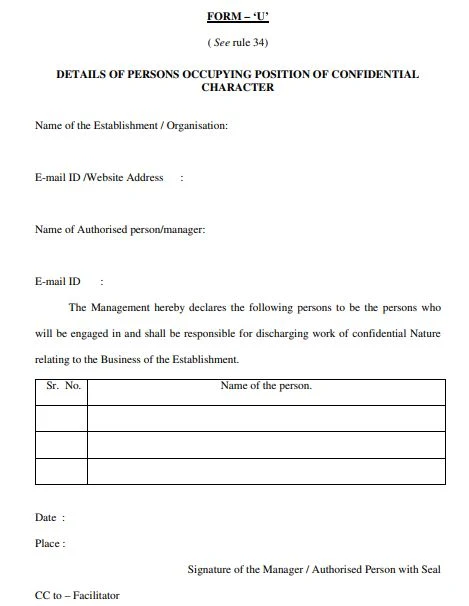
35. Name Board to be in Marathi.-The Name Board of every establishment shall be
in Marathi language in Devnagari Script and shall essentially be written in the beginning:
Provided that, the employer may also have the Name Board in any other language
and script in addition to Marathi in Devnagari Script.
Provided further that, the font size of Name Board in Marathi shall not be less than
that of the Name Board in any other language:
Provided also that, no establishment where liquor is served or sold shall have a
Name Board in the name of legends or fort.
36. Cancellation of registration certificate.- Where the Facilitator proposes to take
action under section 8 of the Act for cancellation of registration he shall, -
(i) by a notice require the employer to submit his say as to why the registration shall
not be cancelled;
(ii) if, within ten days from the date of the receipt of the notice, the employer fails to
submit his say alongwith relevant documents, the Facilitator may cancel the registration.
If within the period of ten days, the employer submits his say along with all relevant
documents the Facilitator may, after considering the say and the documents either
withdraw the notice or cancel the registration as he may deem fit

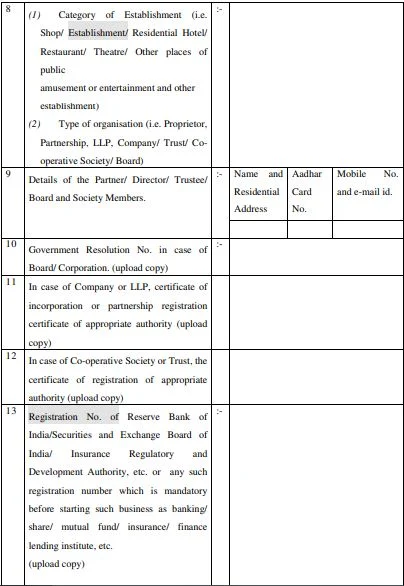







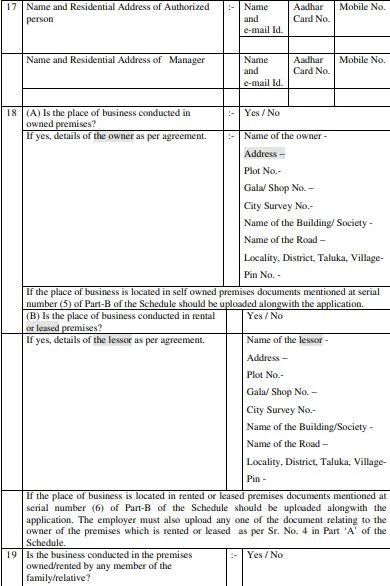



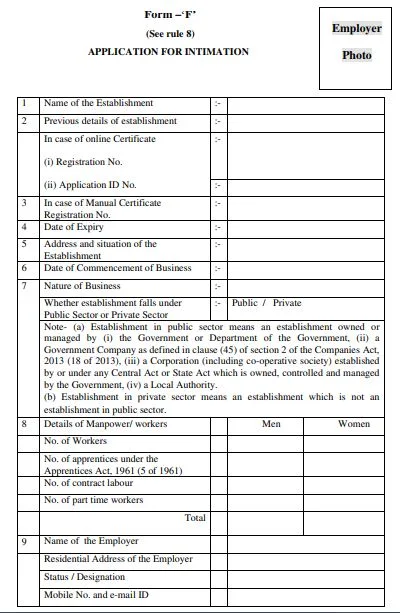









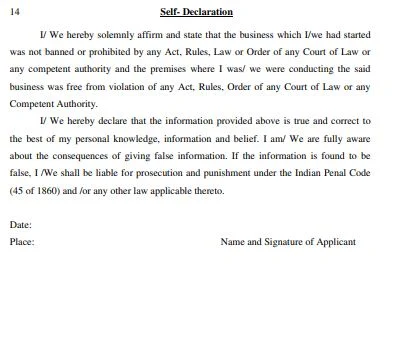
















Thanks For Sharing This Amazing Use Information. Do You Know About Law Visit Our Site
ReplyDeletePOSHADVO
powers of icc views of indian courts
same gender complaints under posh
POSH ACT 2013
types of sexual harassment
Posh Act Rule